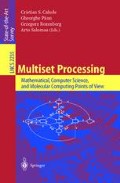Abstract
P systems, introduced by Gh. PĂun, form a new class of distributed computing models. Many variants of P systems were shown to be computationally universal. In this paper, we consider several classes of P systems with symbol-objects where we allow the catalysts to move in and out of a membrane. We prove universality results for these variants of P systems with a very small number of membranes.
Access this chapter
Tax calculation will be finalised at checkout
Purchases are for personal use only
Preview
Unable to display preview. Download preview PDF.
References
J. Dassow, Gh. Păun, Regulated Rewriting in Formal Language Theory, Springer-Verlag, Berlin, 1989.
R. Freund, C. Martin-Vide, Gh. Păun, Computing with membranes: Three morecollapsing hierarchies, submitted, 2000.
R. Freund, Gh. Păun, On the number of nonterminals in graph-controlled, programmed,and matrix grammars, Proc. of MCU Conf.. Chisinău, Moldova, 2001.
M. Ito, C. Martin-Vide, Gh. Păun, A characterization of Parikh sets of ET0Llanguages in terms of P systems, in vol. Words, Semigroups, Transducers (M. Ito, Gh. Păun, S. Yu, eds.), World Scientific, Singapore, 2001, in press.
S.N. Krishna, Computing with simple P systems, Workshop on Multiset Processing,Curtea de Argesc Romania, 2000.
M. Madhu, K. Krithivasan, P systems with membrane creation: Universality andeficiency, Proc. of MCU Conf.. Chisinău, Moldova, 2001.
Gh. Păun, Six nonterminals are enough for generating each r.e. language by amatrix grammar, Intern. J. Computer Math., 15 (1984), 23–37.
Gh. Păun, Computing with membranes, Journal of Computer and System Sciences,61, 1 (2000), 108–143.
Gh. Păun, Computing with membranes. A variant: P systems with polarized membranes,Intern. J. of Foundations of Computer Science, 11, 1 (2000), 167–182.
Gh. Păun, Computing with membranes: Attacking NP-complete problems, Unconventional Models of Computation-UMC2K ( I. Antoniou, C. S. Calude, M. J. Dinneen, eds.), Springer-Verlag, London, 2000, 94–115.
Gh. Păun, Computing with membranes (P systems): Twenty six research topics,Auckland University, CDMTCS Report No 119, 2000. (http://www.cs.auckland.ac.nz/CDMTCS).
Author information
Authors and Affiliations
Editor information
Editors and Affiliations
Rights and permissions
Copyright information
© 2001 Springer-Verlag Berlin Heidelberg
About this paper
Cite this paper
Mutyam, M., Krithivasan, K. (2001). Universality Results for Some Variants of P Systems. In: Calude, C.S., PĂun, G., Rozenberg, G., Salomaa, A. (eds) Multiset Processing. WMC 2000. Lecture Notes in Computer Science, vol 2235. Springer, Berlin, Heidelberg. https://doi.org/10.1007/3-540-45523-X_12
Download citation
DOI: https://doi.org/10.1007/3-540-45523-X_12
Published:
Publisher Name: Springer, Berlin, Heidelberg
Print ISBN: 978-3-540-43063-6
Online ISBN: 978-3-540-45523-3
eBook Packages: Springer Book Archive

